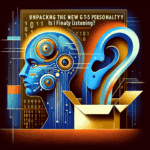Have you ever woken up to find a notification that your flight was rebooked due to a delay, your grocery order placed based on your fridge’s inventory, or perhaps your investment portfolio subtly rebalanced? It sounds like science fiction, right? But the quiet revolution is already here, and it’s driven by AI agents making decisions. These aren’t just smart tools; they’re the software that is learning, anticipating, and acting on your behalf, often without a single prompt from you.
We’re entering an era where our digital tools are no longer passive servants awaiting our commands. Instead, they are becoming proactive partners, capable of initiating actions and making choices. This isn’t just an upgrade; it’s a fundamental shift in how we interact with technology, moving from managing software to delegating to it.
Defining the Landscape
Beyond Chatbots: What AI Agents Actually Are (And Why It Matters)
Forget the simplistic chatbots that merely answer questions. AI agents are a different breed entirely. They possess a critical triad of capabilities: perception, reasoning, and action. They observe their environment (your data, your schedule, market trends), process that information, reason about the best course of action to achieve a goal, and then execute that action. This means they don’t just respond; they initiate. They are the digital equivalent of a personal assistant who not only understands your requests but also foresees your needs and handles them proactively.
This shift moves us beyond mere large language models that generate text. AI agents leverage sophisticated AI reasoning capabilities to plan and adapt, making them truly autonomous entities in a digital space. The implications are profound, changing everything from how we manage our calendars to how businesses operate.
The Invisible Revolution: AI Agents Already Running Your Life
You might not realize it, but AI agents are already woven into the fabric of your daily existence. Think about your smart home system that adjusts the thermostat before you arrive, or your email inbox that automatically filters spam with uncanny accuracy. These are nascent forms of AI agents. They learn your preferences, adapt to changing conditions, and take minor actions to optimize your comfort or productivity. Their presence is often so seamless that we barely notice them, yet their quiet work streamlines countless aspects of our lives.
From Reactive to Proactive: The Fundamental Shift Nobody’s Talking About
The most significant, yet often overlooked, change with AI agents is the move from reactive to proactive operation. Traditional software waits for your input. You click, you type, you command. AI agents, however, are designed to work in the background, identifying opportunities or potential issues, and then acting on them. This paradigm shift means less time spent on mundane management and more time freed up for higher-level thinking, creativity, or simply, living. It’s about offloading not just tasks, but the cognitive burden of decision-making itself.
Current Examples/Case Studies
How Shopify’s AI Agents Are Replacing Entire Marketing Teams
Imagine a retail brand leveraging an AI agent that monitors inventory, analyzes sales data, predicts demand fluctuations, and then autonomously launches targeted marketing campaigns on social media and email. This isn’t far-fetched. Advanced AI agents can handle everything from copywriting and visual asset selection to budget allocation and performance optimization, effectively becoming a hyper-efficient, always-on marketing department. They analyze billions of data points in real-time, adapting strategies far faster than any human team could, leading to unprecedented ROI for businesses using these powerful tools.
Inside Google’s Experiment: AI Agents Managing Ad Campaigns Better Than Humans
While Google hasn’t explicitly stated this, the direction of its ad platforms points towards increasingly autonomous AI agents. These agents can analyze user behavior across the web, identify optimal bidding strategies, craft ad copy, and even generate images – all to maximize campaign performance. They can adjust in milliseconds to market shifts, optimizing spend and reach with a precision that human ad managers can only dream of. The goal isn’t to replace humans, but to empower them to focus on high-level strategy, leaving the constant, granular adjustments to the AI.
The Trading Bots That Never Sleep (And Never Panic)
In the volatile world of financial markets, milliseconds can mean millions. AI trading bots are the quintessential example of AI agents making decisions. They execute trades based on complex algorithms, analyzing market sentiment, news feeds, and technical indicators faster than any human. Crucially, they lack human emotions like panic or greed, adhering strictly to their programmed logic, which often leads to more consistent and profitable outcomes. These bots have redefined high-frequency trading and are expanding into broader investment management, proving the efficacy of autonomous decision-making.
Technical Deep Dive Sections
The Three Ingredients Every AI Agent Needs to Make Decisions
For an AI agent to truly make decisions, it requires three core components:
- Perception: This is the agent’s ability to gather and interpret information from its environment. This could be anything from analyzing a user’s calendar entries, monitoring stock prices, or processing vital signs from a wearable device. It’s how the agent “sees” and “hears” its world.
- Reasoning/Planning: Once data is perceived, the agent needs to process it, understand its context, and formulate a plan to achieve its goals. This involves complex algorithms, logical frameworks, and often, iterative self-correction. Google’s pioneering work in self-improving AI agents showcases this continuous learning loop.
- Action: Finally, the agent must be able to execute its plan. This could be sending an email, adjusting a setting, placing a trade, or alerting a medical professional. Without the ability to act, the perception and reasoning remain theoretical.
These three elements form a continuous loop, allowing the agent to constantly adapt and refine its behavior.
Autonomous vs. Semi-Autonomous: Where We Draw the Line (For Now)
The spectrum of AI agent autonomy is vast. At one end are semi-autonomous agents, which act as powerful recommendations engines or perform tasks only after human approval. Think of your smart assistant suggesting a route or adding an item to your grocery list for your review. On the other end are fully autonomous agents, which operate independently, making decisions and executing actions without direct human oversight, like the trading bots mentioned earlier. The line between these two is fluid and constantly shifting, driven by technological advancement and, crucially, societal comfort and regulatory frameworks. It’s a balance between efficiency and control.
Why Your AI Agent Needs to Forget Things to Be Truly Useful
This might sound counterintuitive, but for an AI agent to be truly effective, it needs a sophisticated way to “forget” or, more accurately, to prioritize and discard irrelevant information. Imagine an agent trying to manage your life while remembering every single email, search query, and minor interaction from the past decade. It would be overwhelmed. Instead, effective AI agents employ advanced memory management techniques, focusing on recent, relevant information and learning to filter out noise. This selective retention allows them to remain agile, efficient, and responsive, without getting bogged down in an endless sea of data. It’s about dynamic context management, not true amnesia.
Real-World Impact Sections
The Customer Service Agent That Never Says ‘Let Me Transfer You’
Gone are the days of endless hold music and being bounced between departments. AI agents are revolutionizing customer service by handling complex queries end-to-end. They can access customer histories, diagnose problems, offer solutions, and even process refunds or reorders – all autonomously. This doesn’t just improve efficiency; it creates a seamless, frustration-free experience for the customer, as the AI agent can resolve issues in real-time, 24/7, without the need for human intervention unless absolutely necessary. This frees up human agents for truly complex or empathetic interactions.
How AI Agents Are Rewriting the Rules of Personal Finance
Managing money can be daunting, but AI agents are simplifying it dramatically. Imagine an agent that analyzes your spending habits, optimizes your budget, identifies opportunities for savings, and even executes investments based on your risk tolerance and financial goals. These agents can monitor market fluctuations, suggest bill payment optimizations, and flag unusual transactions for fraud prevention. They’re becoming the ultimate personalized financial advisors, ensuring your money works harder for you, silently and efficiently.
The Healthcare Revolution: When AI Agents Monitor Your Vitals 24/7
Perhaps one of the most impactful applications of AI agents is in healthcare. Wearable devices and smart home sensors can continuously stream vital health data to an AI agent. This agent can monitor for deviations, detect early signs of illness, alert medical professionals in emergencies, and even manage medication schedules. This always-on monitoring offers unprecedented levels of personalized care, potentially saving lives through early intervention and providing peace of mind for patients and their families. It’s a proactive approach to health management that was once only a dream.
The Dark Side/Concerns
When AI Agents Make the Wrong Call: Who’s Really Responsible?
This is perhaps the biggest ethical dilemma surrounding autonomous AI agents. If an AI trading bot makes a catastrophic error, or a healthcare agent misinterprets data, leading to adverse outcomes, who bears the responsibility? Is it the developer, the user who deployed it, or the AI itself? The legal and ethical frameworks for attributing accountability are still in their infancy. As trusting superintelligent AI becomes more common, defining clear lines of responsibility is paramount to ensuring safe and ethical deployment.
The Control Paradox: Giving Up Decision-Making to Stay in Control
While AI agents promise to free up our time and cognitive load, they also introduce a paradox of control. To gain the full benefits of autonomy, we must surrender a degree of decision-making power to the machines. This raises questions: how much control are we comfortable giving up? Will over-reliance on AI agents diminish our own decision-making skills? Striking the right balance between convenience and maintaining human agency is a critical challenge as these technologies evolve.
Privacy in the Age of AI Agents: What They Know vs. What You Think They Know
For AI agents to be effective, they need access to vast amounts of personal data – your schedules, financial habits, health metrics, and even your emotional states. This raises significant privacy concerns. How is this data being stored, used, and protected? Are there clear boundaries on what an AI agent can “know” about you, and who else has access to that knowledge? Understanding the data footprint of your AI agents is crucial, and robust privacy regulations are essential to prevent misuse or breaches.
Future Implications
The Death of the To-Do List: When Everything Just Happens
Imagine a world where your to-do list becomes obsolete. Your AI agent handles everything from scheduling appointments and ordering supplies to managing household chores and booking travel. Your brainpower is freed up for truly creative or strategic endeavors. This isn’t about laziness; it’s about radical efficiency and offloading the mental burden of endless micro-management. Life could become less about “doing” and more about “being.”
Why 2025 Will Be the Year Humans Stop Managing Software
We are rapidly approaching a tipping point where direct, granular management of software becomes the exception, not the rule. The emergence of powerful AI agents means that humans will increasingly operate at a higher level, delegating entire workflows and projects to autonomous systems. This will fundamentally reshape the future of work, requiring new skills focused on guiding, overseeing, and collaborating with AI, rather than direct execution. Businesses will need an AI Chief of Staff to navigate this landscape.
The New Digital Divide: Agent-Haves vs. Agent-Have-Nots
As AI agents become more sophisticated and integral to daily life, a new form of digital divide could emerge. Those with access to powerful, personalized AI agents will have a significant advantage in productivity, financial management, health outcomes, and overall quality of life. Conversely, those without access or the literacy to utilize these tools effectively could find themselves at a disadvantage, widening existing socio-economic gaps. Ensuring equitable access and education will be paramount.
Conclusion/Practical Takeaways
The rise of AI agents making decisions on our behalf is not a distant future; it’s happening now. This revolution promises unprecedented levels of convenience and efficiency, transforming how we work, live, and interact with the digital world. However, it also presents profound questions about control, responsibility, and privacy that we, as individuals and societies, must actively address.
For individuals, the key is to start experimenting. Begin with smaller, semi-autonomous tasks, understand the capabilities, and gradually increase delegation as you build trust. For business leaders, the strategy should be to start small, think big, and prioritize ethical deployment. Invest in understanding how these agents can truly augment your workforce, rather than just automate tasks. Focus on the questions: What decisions can an AI agent make better or faster than a human? What level of autonomy are we comfortable with? And most importantly, how do we ensure these powerful tools serve humanity’s best interests?
This isn’t just about adopting new technology; it’s about evolving our relationship with intelligence itself. The future isn’t about humans vs. AI, but humans with AI, working in a partnership that redefines what’s possible.
What are your thoughts on AI agents making decisions for us? Are you excited about the potential convenience, or concerned about the implications for control and privacy? Share your perspectives in the comments below!



